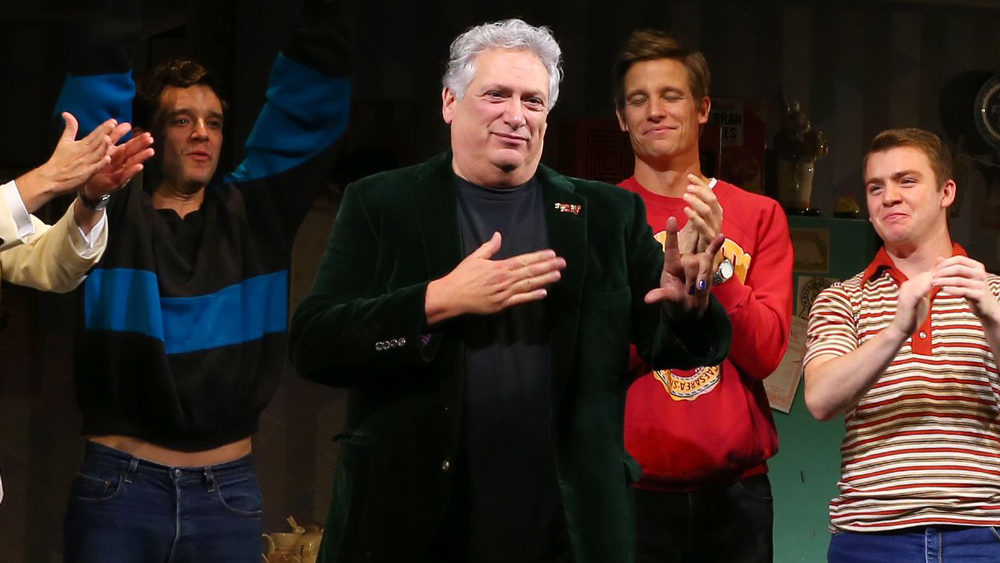‘Torch Song’ Legacy Celebrated at Play’s Revival Opening Night
By Alex Barasch
LOS ANGELES (Variety.com) – Thursday night’s performance of “Torch Song” at the Hayes Theater was both a premiere and a homecoming. Harvey Fierstein’s “ Trilogy” first arrived on Broadway on the same stage more than three decades ago – and changed the lives of a generation of actors, directors, and theater-makers in the process.
As producer Richie Jackson recounted on the red carpet, he was just 17 years old when his mother told him about the “extraordinary play” she’d seen in the city and that she was taking him to see it too.
“I had not told anybody I was gay,” he explained. “I sat down in the theater, and the character Arnold was the first gay person I had ever met. And my mother used theater as a keyhole to show me what could be possible for me.” Arnold’s confrontation with his mother at the end of the play proved just as important to Jackson’s own life. “After the show was over, she took me to dinner and said, ‘You know, if you ever came home and said you were gay, I would never react like the mother in that play.’ She just made me feel safe. It was an extraordinary gift.”
Jackson had already been immersed in theater, but “Torch Song” pushed him to pursue producing as a career. “It was an aspiration, that I would grow up to be the one who revived ‘Torch Song’ on Broadway for the first time,” he told Variety. And he believes it’s come at exactly the right moment: “Gay bashings, families not accepting their children, people having difficulty coming out – it’s all still very present in our lives. And with the world we live in, this Trumpian, despicable world, our rights are being taken away. I felt very strongly that young gay people who are being born into a world with gay marriage, with a drug to prevent HIV, with gay people on TV, that they would have a false sense of security. And I wanted them to see the warriors who got us all this advancement, so they would know how to fight.”
For Tony Award winner BD Wong, the original “Torch Song Trilogy” was “the reason why I’m here tonight. It’s embedded in my DNA as a young gay man and as a young actor coming to New York.” He arrived in the city just after it opened on Broadway and vividly remembers connecting with the role of David, Arnold’s adoptive son. “The announcement for the audition for that part [for the national tour] came out on a Thursday, and I went to the stage door immediately after reading about it in the papers. I waited for hours. Harvey [Fierstein] came out, and I said, ‘I just have to ask you – I know this is really weird – would I have a chance going to this audition?’ I’m a person of color, and I came full of doubt as to whether or not there were opportunities for me. My interaction with him was life-changing because without hesitation, he said, ‘You must absolutely go.’”
“I had confidence that I would never have had if he hadn’t done that for me,” Wong said. “I’ve always drawn from that experience of a person in a position to influence a younger person and say, ‘This is a chance that you should take.’”
Director Moisés Kaufman was also transformed by the play when he saw it at 19. “I came from Venezuela, where there were no representations of gay people, so being in that theater that day and seeing that you could be Arnold or you could be Ed or you could be David or you could be Allen – it changed my life because it taught me that my life was possible,” he told Variety. “It taught me that there was a certain kind of work I could do as an artist. That place where great art and great politics come together is where I want to live.” He would go on to write “The Laramie Project” with those values in mind.
Michael Urie stumbled upon “Torch Song Trilogy” at an even younger age than his director. “I discovered it in the play library at my drama club. I sat in a corner and read it and was blown away by so many things. It was very educational for a 15-year-old in Plano, Texas!” he said, laughing. At the time, he related most to Ed, a closeted character who struggles with his sexuality. “I didn’t know quite who I was yet.”
His view of the play and its characters has changed since that first encounter – and even since he took on the starring role in 2017. “It resonates differently even now from when we did it Off-Broadway,” he said. “So many things have been realized, and yet there are conversations happening in this play that are unresolved for people who come to see it. Every night, I see somebody at the stage door who says, ‘That’s my experience. I just had that conversation with my mother.’ And that’s crazy! It’s 2018, and we need this play.”
Mercedes Ruehl, who plays opposite Urie as Arnold’s mother, feels the same way. “It’s still powerful because some of the conditions and the lack of understanding that gave rise to the play still exist. Yes, we’ve evolved, but look where we are right now: we’re in one of the most confining governments in the last century. So, the need for this play is still very much out there – the need for a play that says, ‘Break down your prejudices, and come to love.’”

